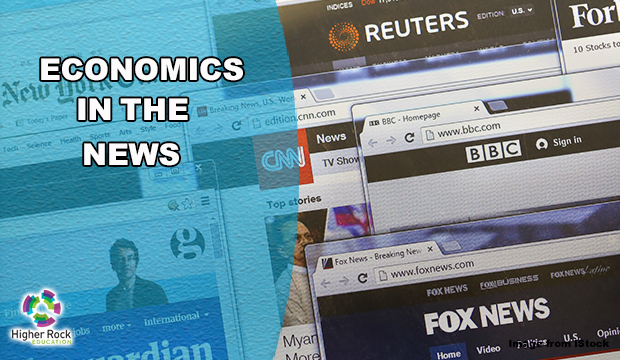Economics in the News – Feb 21-27, 2022
Economics impacts our lives every day. Below are some of the top storylines from this past week related to economics.
- Small businesses are struggling to keep up with high inflation, a tight labor market, stressed supply chains and dwindling liquidity, deepening the challenges that many small business owners have faced since the COVID-19 pandemic began. Large corporations can rely on their financial strength and bargaining power with suppliers to endure supply-chain issues. A growing demand enables companies to increase prices, which increases profits. But small business owners facing supply shortages are having trouble meeting the demand and losing business to larger companies. They are bracing for a long-term impact on sales if their companies cannot serve their customers as adequately as larger businesses.
According to a recent Goldman Sachs survey, 84 percent of small businesses said that inflationary measures had worsened since Sept. 2021. The majority of the owners reported that inflation had negatively impacted their business’s financial health. [The Wall Street Journal]
- Russia’s invasion of Ukraine appears to be the most serious war in Europe since World War II. It could have massive ramifications for a global economy that has yet to fully rebound from the shock of the COVID-19 pandemic.
Following Russia’s full-scale invasion of Ukraine early Thursday morning, the price of oil and European natural gas spiked. Bloomberg Economics investigates three scenarios and the potential impact that each could have in regard to economic growth, inflation and monetary policy. [Bloomberg]
- World leaders have condemned Russia’s full-scale invasion of Ukraine, slapping sanctions on Russia’s economy, the inner circle of Russian President Vladimir Putin and many of the country’s oligarchs. The United States, European Union and other allies announced a round of sanctions against Russian banks and leading businesses.
While the original sanctions excluded the SWIFT global financial system, the United States and European nations agreed on Saturday to ban some Russian banks from SWIFT. SWIFT is the world’s primary communication services that links financial institutions worldwide. A bank that cannot use SWIFT would have extreme difficulty sending money to other financial institutions. The sanctions, if fully carried out as planned, will severely damage the Russian economy and constrain its ability to import and export goods. [Associated Press]
- Counterintuitive to the many tech workers who continue to work remotely, big tech giants such as Google, Apple and Meta are spending billions of dollars expanding their office space. Workplace experts said that contributing factors include a hiring boom, a race to retain and attract top talent. And a sense that office space will continue to play a key role in the future of the workplace.
Companies are trying to lure employees back to the office by splurging on prime office space and offering great amenities. The search for land has seen the tech giants seek areas outside Silicon Valley and not traditionally known for tech talent. [The New York Times]
- A review of census survey data conducted by The Washington Post has revealed that low-income parents have been disproportionately hit with child-care closures caused by COVID-19 outbreaks. Day-care disruptions sharply increased in the months of December and January, as cases of the omicron variant surged.
Lower-income families were more likely to resort to unpaid leave or quit work altogether to tend to their child, while higher-income families were more likely to use paid vacation or sick leave.[The Washington Post]
